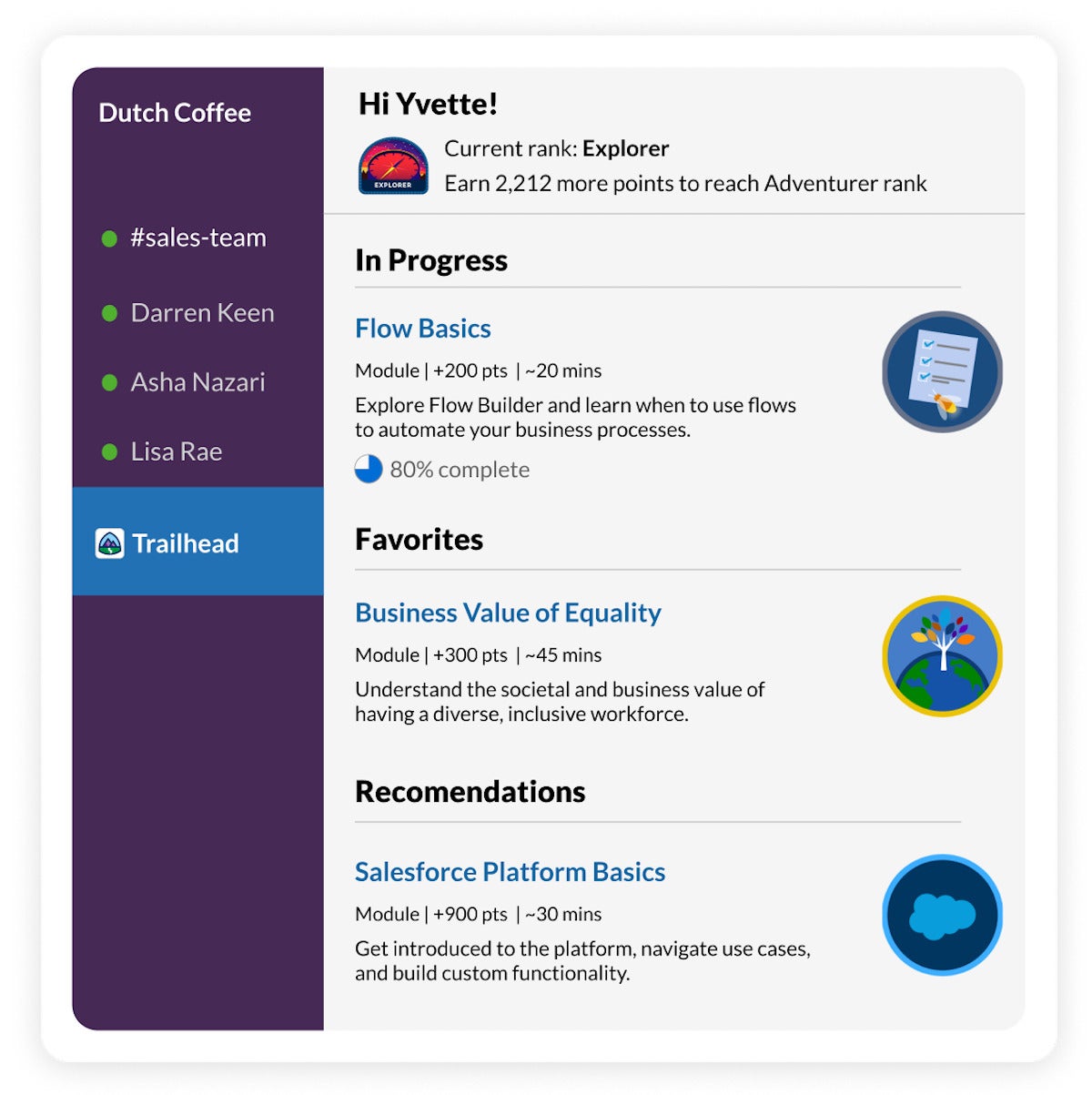The majority of Salesforce products have now been integrated with Slack’s popular team collaboration app.
Salesforce unveiled the latest steps in its plan to connect Slack’s team collaboration platform with its Customer360 product suite on Tuesday, as it seeks to create a “digital HQ” for customers.
Salesforce bought Slack for $27.7 billion last year to provide a collaborative layer around its various apps; the acquisition officially closed two months ago. The company unveiled an initial set of integrations last month, promising new ways to access Salesforce Sales, Service, and Marketing Clouds from the team collaboration app, as well analytics tool Tableau.
At its Dreamforce conference this week, Salesforce announced a raft of additional integrations, ranging from Commerce to MuleSoft and Quip, as well as options for vertical industries. “While the integrations between the products vary in breadth and depth, it highlights Salesforce’s determination to position Slack as the front-end for Customer 360, and the place where productive work actually takes place,” said Angela Ashenden, principal analyst at CCS Insight.
Deeper first-party integrations are good news for customers of both vendors, many of which overlap, said Jason Wong, Gartner research vice president. Salesforce previously stated that 90% of Slack customers were already using its products before last year’s acquisition was announced. “…Whether this will compel non-Slack customers to adopt Slack will remain to be seen as more use cases get fleshed out in 2022,” said Wong.
Integrations across Salesforce’s Customer 360
Among the numerous “Slack-First” integrations touted at Dreamforce is the ability to connect Salesforce Commerce Cloud with the collaboration app. This provides alerts to users in Slack, such as notifying them when metrics in the ecommerce platform are out of date or alerting service agents about problems with orders.
“Think about resolving an order issue: there’s a problem and you’re trying to get something to a vendor or a customer,” said Martie Burris, senior product manager at Salesforce. “Now you can quickly ‘swarm’ on that issue, have conversations, jump into a huddle as needed. You can also create specific workflows that give you updates.”
The existing integration between Slack and Quip, the word processing and spreadsheet app Salesforce acquired in 2016 for $750 million, also got an update. Quip documents can now be embedded and viewed in Slack to enable teams to discuss documents. And while it’s not currently possible to edit the docs directly, this is a possibility post-acquisition, said Burris.
There are also new integrations between Salesforce’s data and application integration platform Mulesoft and automation technologies such as Slack’s App Builder and Salesforce Flow. These will let customers “knit Slack into their wider application ecosystem and enterprise processes, which aligns — or conflicts, depending on your viewpoint — with Slack’s goal of becoming the hub for process-based activities,” said Ashenden.
Slack integration with Salesforce’s Trailhead, a rival to Microsoft Teams and Viva
An integration with Salesforce Trailhead will also make the learning platform more accessible by enabling users to search for information from within Slack.
“Trailhead for Slack allows for learning to happen right in the flow of work,” said Burris. “Instead of logging into Trailhead and trying to find the appropriate [entry] in the directory, now we have Trailhead right here on Slack; I can search in the context of Slack, then quickly share that out to somebody who may need some help. And that’s a big game changer for us.”
 Salesforce
SalesforceThe deepening connections between Slack and Salesforce comes as rival Microsoft also embeds its Teams collaboration app in its Dynamics 365 business apps, as well as its Viva employee experience tool. The integration of Slack and Trailhead echoes Microsoft’s integration of Teams and Microsoft Viva’s Learning module, which surfaces content from LinkedIn Learning and Microsoft Learn in a similar way, said Ashenden.
“Given the goal of both Slack and Microsoft Teams to be the primary place where employees access all their applications and workflows, and with the growing focus among businesses on the importance of employee enablement and experience in the light of ‘the great resignation’ we’re seeing at the moment, this could be an important strategy for both companies,” she said.
More Slack-First integrations to roll out in 2022
The list of various Slack integrations announced at Dreamforce include:
- Salesforce Healthcare and Life Sciences (available now);
- Salesforce CMS (Spring 2022);
- Salesforce Nonprofit Cloud (Spring 2022);
- Salesforce Education Cloud (Summer 2022);
- Salesforce Financial Services Cloud (Summer 2022);
- Salesforce Philanthropy Cloud (2022);
- Tableau CRM (2022);
- And Salesforce Sustainability Cloud (2022).
A detailed list of planned integrations is available online. Salesforce also said that the first set of Slack integrations announced last month – with Sales, Service and Marketing Cloud – will be generally available in by summer 2022.
In related news at Dreamforce, Slack announced the general availability of “clips,” its video and audio messaging feature for all paid users.
This article originally appeared on ComputerWorld.
